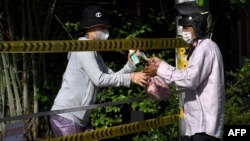Small food-related protests took place in Phnom Penh’s Meanchey district, as residents in red zones have started to complain about closed markets and no access to food aid.
Dozens of residents in Meanchey district’s Phneat village, which has been designated a red zone for the last 12 days, came out of their homes Thursday evening to call for food donations to get them through the next five days, when the city will reassess the three-color zone system.
Residents hung banners from barricades used to block the village, reading “my village is starving.” Deputy Phnom Penh Governor Nuon Pharath attempted to calm the crowd and asked them to return to their homes.
“At this hour, the most important thing is our health and life,” Nuon Pharath told the crowd using a megaphone.
“Of course, we need food to eat and stay alive, which is also important, but the authorities cannot let this virus infect this entire village, entire commune, and the entire district.”
The deputy governor said food aid would go to people who need it the most.
“Those of you who are rich should not pretend that you are poor. But if you are really poor, you need to tell your village chief so that food aid will be delivered to your doorsteps. And to those who have money please try to buy food on your own,” he said.
In a video live-streamed on social media, people could be heard replying to Nuon Pharath that they were poor, living in rented rooms and desperately in need of food.
Thursday’s protests inspired similar collective action in a neighboring village.
40-year-old In Sao, who is a garment worker at a factory that reported COVID-19 cases, said her family – she, her husband, and three children – was eating plain rice and fish sauce. The couple, who live in Stung Meanchey II, do not have any income and are struggling to buy baby formula for their 6-month old baby.
“I am so worried about my next meal that I even cried myself to sleep last night,” In Sao said. “We are in an extreme shortage of foods. Today, we did not have food and money so I asked for a box of canned fish from my neighbor.”
Amnesty International on Friday called on the Cambodian government to avert an impending COVID-19 humanitarian crisis and ensure residents have access to food and essential items.
“The Cambodian authorities need to urgently change course by working with NGOs and UN agencies to facilitate humanitarian access to red zones. Everyone under lockdown must be provided access to adequate food, water, health care and other essential items,” said Yamini Mishra, Amnesty International’s Asia-Pacific Regional Director.
COVID-19 infections and lockdowns are currently concentrated in Meanchey and Por Senchey districts, which have a high density of garment factories and worker housing.
At least 1,700 workers at 206 factories have been infected with COVID-19, putting more than 17,000 other workers into quarantine.








